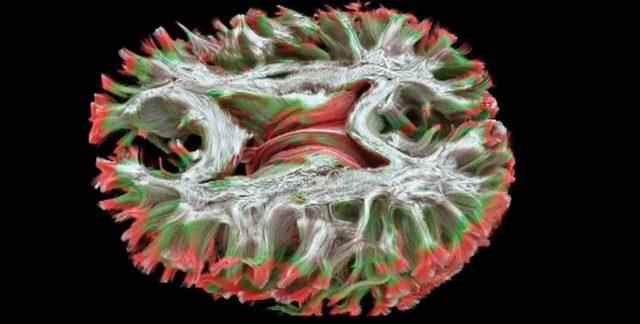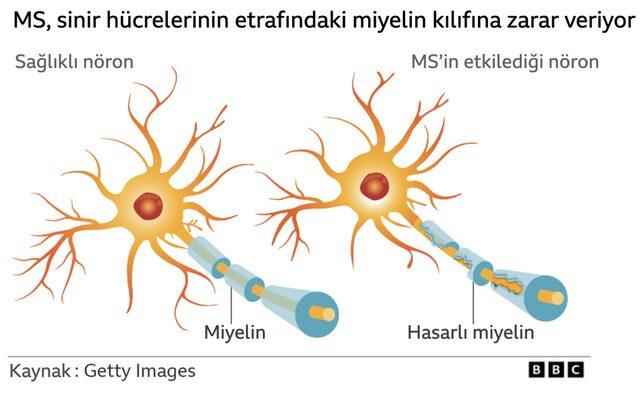About three million people worldwide have the multiple sclerosis (MS) disease known as multiple sclerosis. Scientists think they have uncovered a cause of this incurable disease. This is a virus that almost anyone can catch. So what does this finding mean for MS treatment and even disease prevention?
The brain is like an orchestra of electrical activity. Billions of nerve cells called neurons produce certain electrical signals. When these come together, the resulting symphony determines who we are, our thoughts, our emotions, our control over our bodies, and how we experience the world around us.
However, there is a saboteur in multiple sclerosis. Our own immune system takes action against the neurons and there is no longer a concerted orchestra and this has a devastating effect.
What misleads the immune system is a long-debated topic. But research published this year points to the Epstein-Barr virus.
“There is very strong evidence that MS is probably caused by this virus,” says Professor Gavin Giovannoni of Queen Mary University of London.

detective work
The Epstein-Barr virus (EBV) is so common that almost anyone can get it. Most of us don’t even realize it, but this virus is notorious for the “kiss disease”, also known as glandular fever or mononucleosis.
EBV is transmitted primarily from person to person through close contact with mouth and throat fluids and bodily secretions. It is also called the kissing disease because it is most commonly transmitted through saliva. EBV has been on the list of MS suspects for decades, but conclusive evidence has been difficult to find because the virus is so common and multiple sclerosis is so rare.
The most important piece of evidence came from the US military, which takes blood samples from soldiers every two years. These blood samples, kept in the Department of Defense Serum Storage freezers, are seen as an important resource for research.

“The risk increases more than 30 times”
A team at Harvard University analyzed samples from 10 million people to establish the link between EBV and multiple sclerosis.
The team found 955 people diagnosed with multiple sclerosis and studied the course of the disease by looking at regular blood samples. The results of the research were published in the journal Science.
Harvard’s Prof. “Individuals who are not infected with the Epstein-Barr virus almost never get multiple sclerosis,” said Alberto Ascherio:
“The risk of multiple sclerosis increases more than 30 times after infection with the Epstein-Barr virus.”
The team also checked for other infections, such as cytomegalovirus (human herpes virus), but only the Epstein-Barr virus had a clear link to MS.
After the soldiers were infected with the EBV virus, waste was detected in the blood, indicating signs of brain injury. About five years after infection, he was diagnosed with MS.
prof. Ascherio says the study is the “first” convincing evidence that EBV causes disease. He notes that viruses can infect many people, but only cause serious complications in some. For example, before vaccines were available to prevent childhood diseases, “almost all children” contracted the polio virus, while one in 400 children suffered a stroke.

How can you be sure?
To conclusively prove that the virus plays a critical role in the disease, a study that could prevent people from contracting EBV and see if it prevents MS will be needed.
There are also studies trying to understand what the virus causes in the body.
If we focus on a single neuron (nerve cell), that is, a single instrument in the brain orchestra, this cell is covered with a fatty layer called myelin sheath. It is this layer of fat that allows neurons to fire electrical signals at 100 meters per second. But in multiple sclerosis, the immune system attacks the myelin, disrupting the electrical signals and eventually damaging the neuron.
Depending on which part of the brain or spinal cord is affected, multiple sclerosis can cause numbness, blurred vision, difficulty walking, slurred speech, and some people may find their memory or emotions affected.

Immunologist at Stanford University in California, Prof. Bill Robinson was skeptical of the possibility of EBV until a few years ago. I was saying, “I was underestimated, everybody has EBV, so there’s no way it’s causing MS.”
Now more than just completely convinced, he thinks he can connect the dots between the virus and the myelin sheath.
nature His study, published in the journal Cell, shows that the immune system misdiagnosed the myelin sheath in a confused state, thinking it was fighting the EBV virus and attacked.
Risk factors
prof. Robinson’s team was studying B cells, which are part of the immune system. These cells direct the production of antibodies against viruses and other threats. These antibodies attach to the invading virus and signal the rest of the immune system to come and attack.
In MS patients, they found that antibodies designed to attack a part of the virus (a protein called EBNA1) can also attach to a human protein in the brain (GlialCAM). This misdiagnosis at the molecular level is scientifically known as cross-reaction.
prof. Robinson, “[Virüs] “It also causes cross-reactivity between a viral protein similar to myelin sheath protein, which causes the damage that causes MS symptoms.”
However, this does not happen to everyone infected with EBV. Other factors such as being born at a higher risk of MS, being a woman, experiencing childhood trauma, and where you live (little sunlight and vitamin D levels) can also increase the risk of the disease.

Is vaccination possible?
Such clear knowledge of the cause of multiple sclerosis can give a better idea of how to treat or even prevent it.
Just like the use of a vaccine in the fight against the cancer-causing human papillomavirus (HPV), it can be aimed to achieve success in this regard. HPV infections can increase the risk of cancer, including cervical, penile, and oral cancers. But the childhood and adolescence vaccination program has had such an impact on cancers that the old routine swab tests may no longer be needed.
There are several companies already working on an EBV vaccine, including Moderna, which uses the same technology it used to rapidly develop its Covid vaccine. But it will be necessary to make sure that the vaccines do not trigger the immune system to produce the same false antibodies that play a role in multiple sclerosis.
It will take decades to determine whether multiple sclerosis can be prevented with vaccines. Therefore, for those who already have MS, a “curative vaccine” will be the primary target.
prof. Giovannoni says this would be similar to the shingles vaccine given to people who are infected with chickenpox, “even if you already have the virus, you’re boosting the immune system to create a counter immune response.”
Treatments targeting EBV-infected B cells and drugs that attack the virus itself are also being investigated. prof. Giovannoni says that some studies have observed that HIV drugs reduce the risk of developing MS, so there is “a little clue” that HIV antiretroviral drugs may work in MS.
But there are still great uncertainties.
Once you get EBV, it stays in the body for life as it settles on the antibody-producing B cells.
So is it the first infection to put the immune system on the wrong track?
Or is it the constant presence of the virus that activates the immune system that causes MS?
Researchers have made great strides in understanding the causes of multiple sclerosis; however, using this knowledge to make a significant difference in people’s lives requires new studies.